Uncertainty

Frontera!
John Jota Leaños
Leaños directed and produced the animated documentary, Frontera!, retelling the history of the 1680 Pueblo Revolt in New Mexico. The film has been supported by a 2012 Guggenheim Fellowship in Film and Video and a National Association for Latino Arts and Culture Grant, among others. Collaborators: Conroy Chino (Acoma Pueblo), Warren Montoya (Santa Ana Pueblo, Tamaya and Santa Clara Pueblo, Khapo Owinge’), Lee Moquino (Santa Clara Pueblo, Zia Pueblo, Apache/Yaqui), Aimee Villarreal, and Cristóbal Martinez (Alcalde).
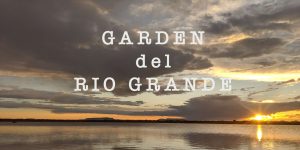
Emilie Trice & LAST/RESORT present Garden del Rio Grande
LAST/RESORT (US)
Garden del Rio Grande pays homage to the geographic region around the Rio Grande River, which runs from central Colorado along the U.S./Mexico border to the Gulf of Mexico. Our garden contemplates how technology can reconnect us to the land and amplify indigenous voices, while questioning to what extent can art and design fortify sustainable ecologies. Through emerging technology we seek to reverse-engineer the past in order to reimagine the future.
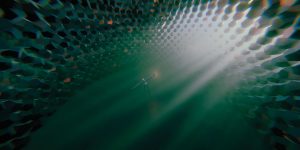
AI x Uncertainty
Jurij Krpan (SL) Speakers: Christl Baur (AT), Suzanne Livingston (UK), Špela Petrič (SL), Stephanie Dinkins (US)
Das Panel konzentriert sich auf die Einschränkungen und Unsicherheiten, mit denen KünstlerInnen im Umgang ihrer künstlerischen Praxis mit KI konfrontiert sind. Was sind die Herausforderungen der Zusammenarbeit an der Schnittstelle zwischen KI und Kunst? Welche Fortschritte lassen sich erkennen, und wo scheitert sie? Mit welchen Problemen sehen sich KünstlerInnen konfrontiert? Welche Rahmenbedingungen müssen geschaffen werden, damit KünstlerInnen Zugang zu den neuesten Forschungsergebnissen erhalten?
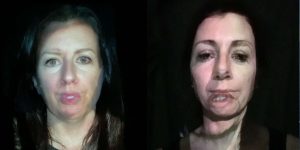
An Atlas of Absence - Online meeting performance
Summer Mei Ling Lee and Laura Boles Faw
Technology was supposed to connect us. The dominant modality for communication and connection during this pandemic era is the digital screen. In this work, collaborators Laura Boles Faw and Summer Mei Ling Lee continue their ongoing series addressing distance and longing that increasingly figures into this heightened moment.
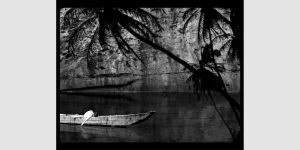
Falling Up Exhibition
re.riddle, California, San Francisco (US)
Amidst riots and racial tensions, divisive political rhetoric and a global pandemic, the past half year has been a time of turbulent uncertainty. These acute ruptures and moments of pain, conflict and unknowingness have inadvertently led to a mode of seeing our former and current realities anew, which may more or less best be described as “surreal”.
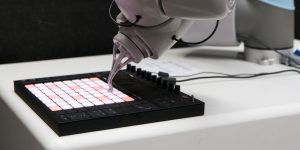
AIxMusic - Artificial Stupidity
Moisés Horta-Valenzuela (MX/US), Artemi-Maria Gioti (GR), Ali Nikrang (AT), Alex Braga (IT) and Portrait XO (US)
Das Panel "Artificial Stupididity" lädt KünstlerInnen des Ars Electronica Festivals ein, ihre Erfahrungen im Kontext von AIxMusic auszutauschen. Das Thema KI bekommt aktuell große Aufmerksamkeit in den Medien und wird kontrovers behandelt.
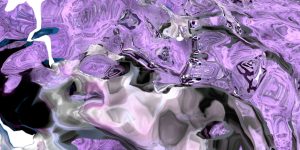
sound:frame & Pausanio virtual – Area for Virtual Art
sound:frame / Eva Fischer (AT), Marijn Bril (NL), Angie Pohl (AT)
sound:frame together with Pausanio presents the Area for Virtual Art – an online platform for digital art and virtual formats. Discover current artistic approaches in virtual exhibitions and meet people in discussion programs and live events to exchange thoughts and create new ideas and concepts. The Area for Virtual Art develops into an international hub, giving a platform to current digital art forms and connecting people all over the world.
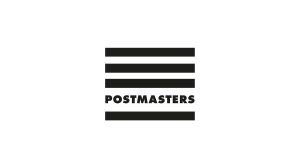
Postmasters presents Nicola Verlato, Donato Piccolo and Kristin Lucas
Paulina Bebecka - Postmasters Gallery, PostmastersROMA, Rome (IT)
In the current uncertain climate of physical disconnection, hyper digital connection and distortion of life as we know it, I wanted to express that humanity is still at the very core of our increasingly technological experience on earth. The chosen artists bring about an examination of reality and the need to cherish our humanity through various digital media, such as artificial intelligence, 3D scanning, 3D gaming software, generative 360 WebXR animation, drones, and techno.

Future from the past: imaginations on the margins
Center for Urban History of East-Central Europe, Lviv, Ukraine (UA)
The Center for Urban History will make video journeys to two places, which are located in rural areas but reflect urban imagination. We will travel to the Center for Space Research and Communication of the National Center for Space Management and Testing of the State Space Agency of Ukraine.

What Type of Crisis is This?
Walter Ötsch (AT)
Die COVID-19-Krise und die Verwundbarkeit der Gesellschaft: Ein Vortrag in vier Teilen.
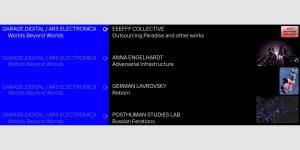
Garage Digital: Worlds beyond Worlds
Garage Museum of Contemporary Art / Nikita Nechaev, Moscow (RU)
Works and practices of several artists and collectives, that participate in Garage Digital program, reflect on the different types of networks, infrastructures, ecologies and algorithms, and pose questions of the possible tactics and strategies to reassemble these systems with new types of communities, modes of rationality and production in mind —cunning, poetic, speculative and emergent.

COVID-19 Crisis: Wie könnte/kann sich die Gesellschaft ändern?
Walter Ötsch, Renata Schmidtkunz, Antonia Birnbaum, Evelyn Bodenmeier, Leonhard Dobusch, Sighard Neckel
Walter Ötsch entwickelt zwei Szenarien für die Zukunft der Gesellschaft: ein positives und ein negatives und gibt einen Überblick, welche positiven und negativen Vorstellungen über die Zukunft im Workshop erörtert wurde. Gemeinsam werden Hindernisse und Optionen für die Zukunft diskutiert.
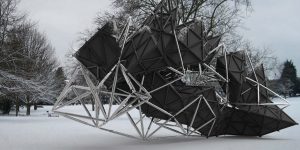
Heterotopias
The Bartlett School of Architecture, University College London (UK)
Roundtable + Q&A - As we collectively detangle our own perceived ‘normal’, how might this shape speculative design and the worlds that come with it? Is Heterotopia an alternative to the utopia/dystopia narrative?
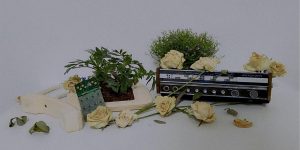
Transformation & Transmission – panel discussion, presentations
A live-streamed presentation of a new selection of works from the exhibition, with live Q&A and panel discussion with the artists. These works range from films, to AR experiences, to hybrid objects, each united by the themes of anxiety, uncertainty, and distance that run through these works. During the festival, we will conduct streamed online tours of the works, show examples, and interview the authors in a live stream hosted every day (times TBC).

re.riddle presents Falling Up
re.riddle, California, San Francisco (US)
re.riddle presents unique programming showcased in site-specific exhibitions and pop-up events worldwide. The itinerant gallery curates socially engaging and multidisciplinary exhibitions of contemporary art. Its mission is to contribute to the discourse on contemporary art in thought provoking and playfully subversive ways. Via new modes of production, reception and consumption, re.riddle places an emphasis on the whimsical, in hopes that art continues to arouse curiosity and promote an awareness of its profound impact on our daily surroundings and lives.

COVID-19 Crisis: Optionen der Zivilgesellschaft und der Sozialen Medien
Walter Ötsch, Renata Schmidtkunz, Leonhard Dobusch, Evelyn Bodenmeier
Experten und Expertinnen präsentieren ihre Sichtweisen, fordern einander heraus und vermitteln Anregungen zur Zukunft unserer Gesellschaft.
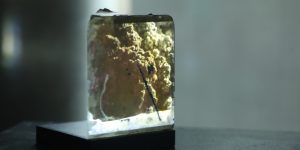
Creative Question Challenge: Can unheard signals inspire change?
Siobhán McDonald (IE), Chris Bean (IE), Adriaan Eeckels (BE)
"Lasst uns beenden, was wir begonnen haben." Auf diese Weise stellt die UNO ihr erstes Ziel für nachhaltige Entwicklung vor - das Ende der Armut in allen Formen und Dimensionen bis 2030. Die 17 Ziele der Nachhaltigen Entwicklung und ihre 169 Teilziele wurden als ein ausuferndes, missverständliches Durcheinander großer Absichten beschrieben. Allein der Titel der Entwicklungsagenda - "Unsere Welt umgestalten" - verströmt utopische Ambitionen. Er wurde 2015 von 193 Nationen angenommen. Fünf Jahre später und mit zehn verbleibenden Jahren: Wie wird sich unsere Welt verändern?

COVID-19 Crisis: Zukunftszenarien
Walter Ötsch, Renata Schmidtkunz, Sighard Neckel, Antonia Birnbaum
Der Schock durch das Coronavirus wird die Gesellschaft verändern, und es wird nicht möglich sein, zum alten "Normalzustand" zurückzukehren. Es werden zwei Szenarien skizziert: (1) Im negativen Szenario wird der Coronavirus-Schock oberflächlich gesehen wenig Veränderung bringen, aber tatsächlich wird er die politische Hülle, die den Kapitalismus umgibt, grundlegend umgestalten. Dies wird in Analogie zu den Entwicklungen nach der Finanzkrise von 2008 erklärt, bei der die Eliten, die die Krise verursacht haben, nicht gefordert und zur Rechenschaft gezogen wurden. In diesem durchaus realistischen Szenario kann sich eine neue autoritäre Form des Kapitalismus herausbilden, in der die neue Macht für die Staaten auch in neue Formen der Überwachung ausgeweitet wird. (2) Das positive Szenario knüpft an viele historische Erfahrungen an, in denen die Welt nach Krisen verbessert wurde. Wir erleben derzeit eine Neugestaltung des politischen Handelns, die durchaus positive Momente hervorbringt, wie neue Formen des kollektiven Gesprächs über Ängste, neue Formen der Solidarität mit Fremden und die Erfahrung, wie wichtig und mächtig Politik sein kann. Vielleicht ist es in diesem Szenario möglich, den Coronavirus-Schock mit der Sorge über die kommenden ökologischen Krisen zu verbinden und wirksame Schritte zu deren Eindämmung zu unternehmen.
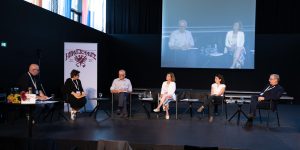
COVID-19-Krise
Walter Ötsch (AT), Renata Schmidtkunz (AT)
Experten und Expertinnen präsentieren ihre Sichtweisen, fordern einander heraus und vermitteln Anregungen zur Zukunft unserer Gesellschaft.
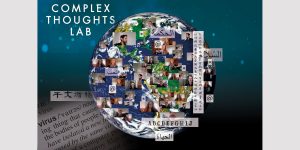
Complex Thoughts Lab
In the post-coronavirus scenario, The Complex Thoughts Lab invites to think outside the box to put together a model of the new world after COVID-19. Are we willing to rethink our nature, the concept of well-being? Will we be able to commit ourselves to bequeath a better world to future generations? The students share ideas to build a world model facing the next generations and transforming the Covid-19 crisis into an opportunity.


